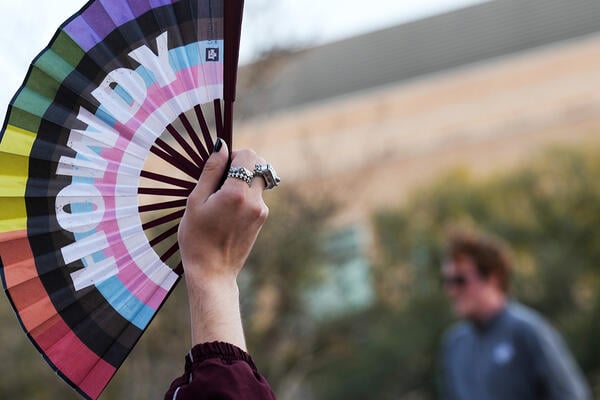Students protested the drag ban at Texas A&M University earlier in March, which a federal judge temporarily blocked. Restrictions on drag performances have become more common in Texas following SB 17’s passage.
Elizabeth Conley/Houston Chronicle/Getty Images
LGBTQ+ college students and employees in Texas say they’ve lost valuable resources and feel less safe on their campuses as a result of the state’s anti–diversity, equity and inclusion law, which went into effect in January 2024, according to a new Campus Climate Report from the LGBTQ+ advocacy nonprofit Equality Texas.
The legislation, SB 17, banned DEI offices and resource centers, which it defined as anything that conducted “trainings, programs, or activities designed or implemented in reference to race, color, ethnicity, gender identity, or sexual orientation” at public colleges and universities. As a result, most of the state’s 36 public universities shuttered their LGBTQ+ student centers, spaces where students could go to seek help from staff, attend events, use resources and simply hang out with other LGBTQ+ students and allies.
Texas was an early adopter of this type of legislation, and now the federal government is also aiming to ban DEI. After taking office in January, President Donald Trump signed an anti-DEI executive order that led several colleges to close their DEI offices or remove language related to diversity and identity from their websites. Equality Texas’s report, released last Thursday, offers a glimpse into what might be on the horizon for those universities and others that have been impacted by state DEI bans—or pre-emptively shuttered offices in anticipation of such laws.
In the months after the ban took effect, researchers interviewed 44 students, faculty and staff across 19 Texas universities about the climate on campus for LGBTQ+ students. Sixty-five percent of the students and 78 percent of employees said that the law had negatively affected them.
Students at public universities told interviewers that, in shuttering DEI offices and LGBTQ+ resource centers, their campuses had eliminated a wealth of important resources, from assistance for those navigating gender-affirming health care to career closets where students can borrow professional attire for job interviews.
Elsie Kindall, Equality Texas’s government affairs associate and the lead researcher on the report, said that the thing most students said they missed was simply having the physical space available to them, whether as a place to relax between classes or as somewhere their LGBTQ+ student organization could meet.
“Knowing this is a place … to meet other LGBTQ+ students … that’s what a lot of the students missed a lot, just having that place for community,” she said.
Students also reported that their organizations are now in charge of handling programming and events that were previously under the purview of the DEI office. In other cases, those groups have been stonewalled and students reported that their colleges made it more difficult to create new initiatives to support LGBTQ+ people.
“Student organization work now feels like a job rather than an extracurricular, and we are not getting properly compensated for our work,” said one interviewee, whom the report identified as a student of color at a public institution.
Staff and faculty, meanwhile, reported that it’s been challenging to navigate the uncertainty of what, exactly, is banned by SB 17. Many said they are afraid they might lose their jobs for speaking up about LGBTQ+ issues—which has made it harder to connect with LGBTQ+ students.
Students and employees alike said that the closure of DEI offices and centers and the elimination of pro-LGBTQ+ initiatives and resources has made them feel unwelcome at their university; as a result, just over half of the students surveyed said they had considered leaving their institution. That number was smaller among faculty and staff, at only 14 percent. Both groups were even more enthusiastic about leaving Texas altogether, with nearly a quarter of employees and a whopping 78 percent of students indicating they’d thought about moving away.
“When SB 17 changed things, it made people feel like they’re being pushed back into a closet and ashamed,” said an employee, identified in the report as a person of color at a public university.
Students and employees at private universities, which do not fall under SB 17, indicated little change due to the legislation, though some students noted that their institutions had few LGBTQ+ resources on campus to begin with. Some LGBTQ+ employees, meanwhile, said they have been even more purposeful about supporting their LGBTQ+ students since the passage of SB 17—and have begun allowing students at nearby public universities to use their campus’s resources, too.
Students and employees also noted a rise in discrimination on campus since SB 17, with just under half of students and 57 percent of employees reporting that they had experienced discrimination themselves. LGBTQ+ students of color were especially likely to feel unsafe on campus.
Equality Texas focuses on statewide issues, so Kindall said that the organization is not engaged in fighting against Trump’s federal anti-DEI actions. But she intends to use the findings of the report to push against attempts to expand SB 17 amid the current legislative session in Texas, which runs through June.








